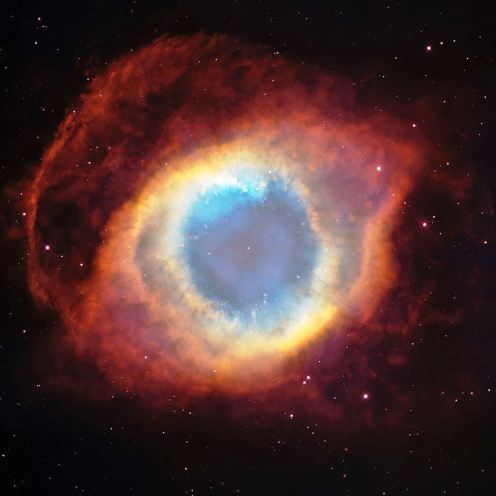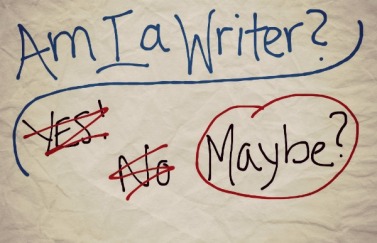
The Helix Nebula, nicknamed the “Eye of God”
Years ago, I blogged about a common big question that often arises in writing.
Namely, the question of when you can properly call yourself a writer.
At the time, I’d just found “The Answer to the Big Question” in my house. This was a list explaining the various circumstances that make one a writer that I’d printed from the internet years earlier when I too was uncertain on this matter.
As the original list no longer seemed to exist online, I quoted the entire thing in my post. The answers it offered showed a clear progression of milestones one might use to identify him/-herself as a writer: everything from,
You’re a writer when you first put pen/pencil/fingers/other writing implement to paper/keyboard/any flat surface
to,
You’re a writer when you get your first acceptance
to,
You’re a writer when you can support yourself by writing
and more.
A commenter claimed that “when you first put pen to paper” was facetious – that whoever said so “is either taking the definition too literally or is a half-wit”, and that the most basic answer to the big question was when you receive your first acceptance.
As a then (and now still) unpublished writer, I was hardly going to go along with that. Not when years of prior soul-searching had led me to deem myself a writer for the fact that I was at work on a novel and writing almost every day.
“I think the shift needs to come a bit sooner,” I wrote in my reply. “It’s a mental game. In my own case, I find that I didn’t take myself seriously as a writer until I … took myself seriously as a writer, if such a circular statement makes any sense.”
This has remained my position for years – the belief that, as I went on in my reply, “by calling yourself a writer sooner, you come to hold yourself to a higher standard, and your work only gets better as a result.”
Recently, however, my opinion on the matter has changed a bit.
Seeing red
This change, not unlike the different entries on the list itself, corresponded to my entering a different stage along my writing journey.
 As regular readers of this blog are aware, I’m currently revising my first novel.
As regular readers of this blog are aware, I’m currently revising my first novel.
I’ve been at it for about four months now, a process I commenced by first reading through the entire manuscript and assigning each chapter a colour based on the extent of its revision needs (either red, yellow, or green, the significance of which should be fairly self-evident).
Right off the bat, beginning with chapter 1 (which has since became chapters 1 and 2), I found myself in the red.
I’d known this was coming, even before that full-story read-through. Four years ago, I’d read aloud a portion of my first chapter to a group of writers I’d begun socializing with, and had been told all but unanimously (and in no uncertain terms, it bears mentioning), that it needed work.
Humbled by this ringing realization that my prose was not, in fact, deathless, I approached draft 2 of my WIP’s first chapter like I had something to prove.
In a way, I suppose I did, if at this point to no one but my own self.
And so I went all in, working on it for hours and days at a time. Upon finishing, I knew I’d definitely made it better than it was, but was it good in its own right?
I thought so, but I may have been a wee bit biased about that. I’d initially liked the original version as well until its weakness were pointed out to me.
I needed an outside opinion, and lucky for me, I had just the folks – a group of writers I’ve been socializing with for years – to turn to. Two of them had even been present the first time I beta’ed this chapter, the time I read aloud.
This time, the format was different – easier even, one might say. I just emailed the two chapters to three of my writer friends and waited to receive their feedback.
It was honestly one of the most nerve-wrecking things I’ve ever done.
Even more so than the times I’ve submitted short stories to magazines in an attempt to get published.
Showing my face
No word of exaggeration, my hands were literally sweating as I composed the email to each friend and attached the document. My breakfast, which I’d been consuming at the time, later became my lunch, for in the moment, I lost my stomach for it.
Writing is such a solitary endeavour, with many months or even years spent living our stories alone inside our heads.
Regardless of how a writer feels about his/her actual writing ability, we all believe our stories are inherently interesting and worth being told. (Or else why would we even bother devoting the time and effort required to do so?)
Whether they’re willing to admit it or not, a lot of writers happen to think they’re hot shit at the act of writing on top of that. I used to believe this; I still do, at least on some level, for again, why would I willingly choose to do something at which I had no skill?
However, there does come a time to put your proverbial money where your mouth is.

Hubble Ultra-Deep Field image of galaxies in the Fornax constellation, composited from the Hubble Space Telescope.
There’s something unique about sharing your writing with people who themselves are writers, particularly if they know you personally.
Having my short stories rejected, while disheartening, was considerably less harmful to your sense of pride by comparison. In those cases, I was just an unknown name on an email.
Even if they Googled my picture, it’s unlikely they’d ever know me to see you on the street. My relative insignificance to them was the ultimate face-saver.
Meanwhile, most of my non-writer friends and family are just be impressed by the fact they know someone who has the patience to write something book length.
The next level
Other writers, however, are doing or have already done the same thing. Plus they know enough of what lies behind the curtain wall to not be impressed by the odd fine turn of phrase.
They will read what you’ve written as the reflection of your writing skill and discernment that it actually is. And they will pass judgement on it.
Which is, in a word, terrifying.
Yet also incredibly edifying, to the point that feel I’ve grown as a writer because of all this. Not just the initial revising of the chapter, but the entire process of soliciting – and receiving – feedback on it as well.
I feel like some dramatic mental shift has occurred – that I’ve hit a true writing milestone that will never again be as difficult as for the very first time.
I felt like a writer before; now I really feel like one.
And so, a new entry I offer up a possible Answer to the Big Question is as follows:
You’re a writer the first time you share your work with other writers for critique.
That, at least, is the definition I’ve since adopted for myself. At least for now – until I reach the next milestone.
In writing, as in most things in life, there truly is no one correct answer.
How do you answer the big question of when you call yourself a writer? Has your answer ever changed? Do other disciplines with the arts have a similar big question that people grapple with? Let me know in the comments.
(Image source #1, #2, and #3)

Bella Mahaya Carter brilliantly answered this question in a post on the She Writes blog June 12, 2014:
Are You a Real Writer?
“There are as many ways to be a writer as there are writers. There’s no correct or right way to do it.
I’ve said this before, and I’ll say it again: We rarely recognize our own gifts. If you have the urge to write, it’s your soul talking. Resist the temptation to judge its message or yourself. You are a real writer. The sooner you claim this title, the easier it’ll be to move forward with your work and with your life.
Doubt is part of the terrain. It’s the landscape we inhabit as writers and as human beings. The only thing that makes sense is to navigate this terrain with as much self-compassion, kindness, courage, and conviction as possible. Trust yourself. Do your work. Writers write. There are lots of ways to do this. All you have to do is find what works for you. Show up on the page, get quiet and listen, speak your truth, and honor that your wisdom is enough—and so are you!”
LikeLike
Thanks, Rita, for sharing this. I definitely agree that there’s no correct way to be a writer than by writing!
LikeLike
Being accepted for publication seems like a weird measure of writerhood. I hope I’m not the one who said that (I’ve been known to say the worst, stupidest things ever). That’s a bit like saying you’re not a musician until you perform on stage. If you know the notes, you know the notes…
My current thinking, which could change tomorrow, is that you’re asking the wrong question. What you really mean is, “When am I properly able to call myself a FICTION writer?”
That’s the benchmark, isn’t it? You’ve successfully and confidently blogged for a few years now, coming up with ideas, presenting an organized case, and drawing conclusions (or not, if using a rhetorical delivery). Your posts are eloquent and easy to understand, despite that you are making them out of little abstract symbols that are supposed to convey meaning when bunched together.
You probably write at your job. You could no doubt place non-fiction articles in magazines or on websites if you made the effort. You critique others’ writing, which you couldn’t properly do if you were unable to see into the bone structure like an x-ray and articulate the damage.
Meanwhile, it’s practically impossible to get paid for fiction writing. It’s the trickiest type of writing to get right, I’ll admit, but the other thing nobody likes to talk about is: Fiction doesn’t make money for anyone, hardly. If it were a big moneymaker, we’d all be published because they’d be clamoring for content. Selling fiction is like trying to sell old VHS copies of Pretty Woman. The publisher doesn’t know that your copy has the weird typo on the box that makes it valuable.
You’re a writer. I’m a writer. Fuggetaboutit.
LikeLiked by 1 person
I hope I’m not the one who said that
Don’t worry, it wasn’t you. Do you think I’d ever let you live something like that down, which would essentially be to say I’ve spent the majority of my adult life (and a goodly part of my childhood life as well) as a not-writer?
You’r right – it is fiction writing that I’m referring to. When I talk about writing, that’s all I ever mean, to the point that I forget to make the distinction. (I just realized the description of my writers’ meetup group doesn’t actually mentions the word “fiction” once, and here I’m wondering why nonfiction writers often turn up.)
For the record, I do consider myself a writer of fiction – I have for a long time now – and consider publication in whatever form to be the endpoint of that fact, not the beginning.
Fuggetaboutit.
LikeLiked by 1 person
I think the question should be “do I love writing stories?” If you love writing stories, you’re a writer. You may be a good writer or you may be a bad writer – and that is totally beside the point when it comes to ‘popular’ writers. There is a load of comment online about good and bad writers. Some people love Fifty Shades while others think it’s absolutely hideous and an insult to “writers” the world over, but it sells. I consider myself a writer because I can’t live my life without it 😉
LikeLiked by 2 people
Well, I definitely love writing stories, so I’m covered in that regard. 🙂 But I think you’re also on to something about not being able to live without it. I think a writer is someone who writes – not necessary every day, but often enough to be producing work on some kind of regular basis. Feeling like you can’t live without it is definitely conducive to doing the writing deed. Good writing vs. bad, as you say, is totally subjective and irrelevant. Say what you want about Fifty Shades – she finished writing the book, which is more than a lot of so-called “better writers” can manage.
LikeLiked by 1 person
I’m with Eric. I’m a published author (does that make me a writer?!) and I’m used to being critiqued. But fiction? There’s a thing! I read my scholarly work and like it. It’s robust, authorial voice is good, the scholarship solid. The writing is clear and at times lovely. I edit well. But fiction writing is different. How do I apply the skills developed through my scholarly writing to my fiction, and is it even possible? Can I be creative? Can I write with a good authorial voice? Can I paint vivid word pictures or is it purple prose? Can I live without writing? Hang on, I’ll just go and read Hilary Mantel’s latest piece on writing in the Guardian for some inspiration.
LikeLiked by 1 person
To me, in all things, people are defined by their actions. So if you’re writing fiction, that makes you a fiction writer, plain and simple. I think it’s possible to be a doer of a certain thing and still improving at that thing at the same time. And being a published author DEFININTELY makes you a writer for that means you done did that writing deed. 🙂
LikeLiked by 1 person
The running community have exactly the same debate – when can you call yourself a runner? The answers vary as widely as the ones to the writer question. (Personally I set the bar very low and regard myself as both 🙂 )
LikeLike
That’s interesting that the running community has this debate, Roy; I never knew that. I consider myself a runner as well as a writer. But I’m curious: what are some of the different positions people take on who is or isn’t a runner?
LikeLike
‘If you go out for a run then you’re a runner.’ ‘You’re a runner when you can jog for 30 minutes.’ ‘You’re only a runner once you pin a race number on.”You’re not a runner until you’ve run the NYC Marathon.’
In my role as a coach to adult beginners I prefer to use the gentler word ‘jog’ to encourage people to start.
LikeLike
Well, I’ve done the first three of these. I continue to do #2 regularly (I just did this morning, in fact). I don’t really care to ever do #3 again, and #4 absolutely definitely not. I consider myself a runner. As I replied to Jess, people are defined by their actions, and it’s possible to be a doer of a certain thing and still improving at that thing at the same time. Your use of the word “jog” in your coaching of beginners is a good idea, for it seems less intimidating. A good way to eliminate all the runner/not a runner noise that likely prevents newbies from thinking they could ever become one.
LikeLike